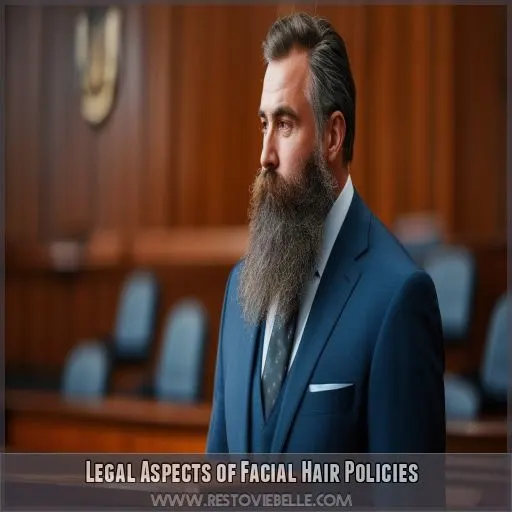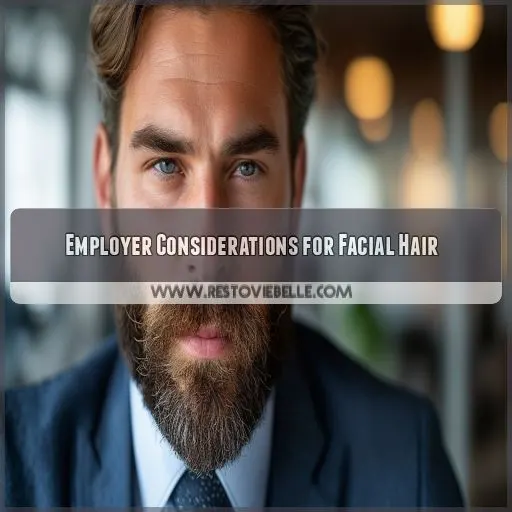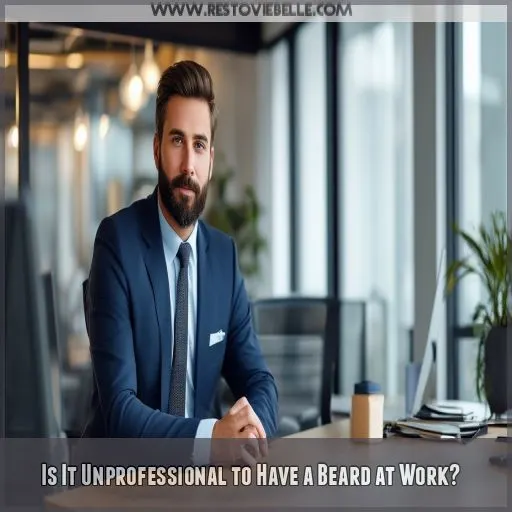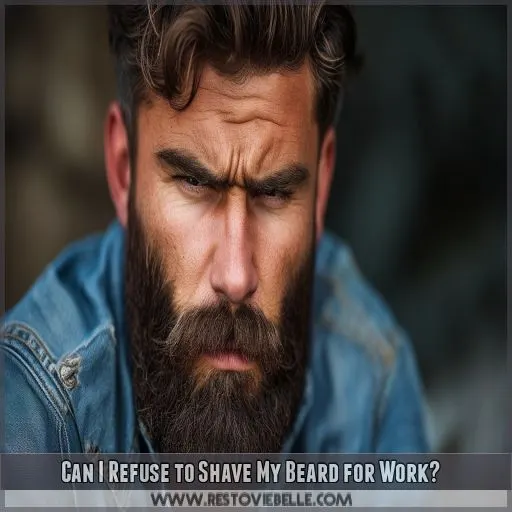This site is supported by our readers. We may earn a commission, at no cost to you, if you purchase through links.
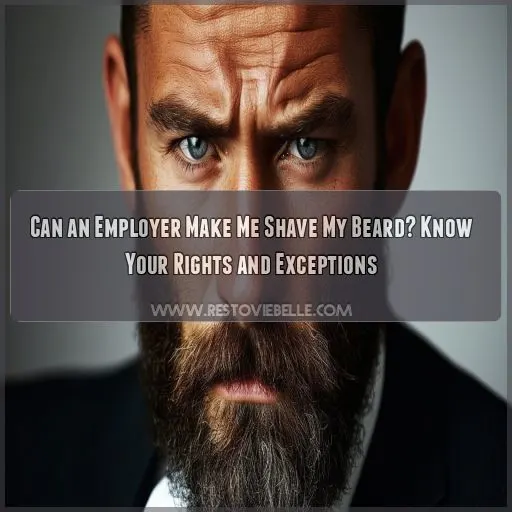 Yes, an employer can make you shave your beard, but there are key exceptions. They must consider religious and medical exemptions. If shaving causes undue hardship due to your religious beliefs or a medical condition, they generally can’t enforce such a rule.
Yes, an employer can make you shave your beard, but there are key exceptions. They must consider religious and medical exemptions. If shaving causes undue hardship due to your religious beliefs or a medical condition, they generally can’t enforce such a rule.
Employers often set grooming standards for safety and hygiene, especially in fields like food service and healthcare. However, open dialogue and clear policies can help balance workplace safety with respect for personal rights.
Interested in understanding these facial hair policies and your rights? Stay tuned, you’ll discover more.
Table Of Contents
- Key Takeaways
- Can an Employer Make Me Shave My Beard?
- Legal Aspects of Facial Hair Policies
- Employer Considerations for Facial Hair
- Diverse Grooming Policies Across Industries
- Practical Solutions for HR and Employers
- Facial Hair Safety Concerns
- Is It Unprofessional to Have a Beard at Work?
- Can I Refuse to Shave My Beard for Work?
- Frequently Asked Questions (FAQs)
- Can I refuse to shave my beard for work?
- Can OSHA make you shave your beard?
- Can an employer fire you for not shaving?
- Is it unprofessional to have a beard at work?
- Can an employer require you to shave your beard?
- Do you have to shave a beard for a promotion?
- Do employers have a right to shave facial hair?
- Why do some employees grow beards?
- Is it legal to refuse to shave your beard?
- Is it legal to keep a beard?
- What are common medical exemptions for beards?
- Do facial hair policies affect job performance?
- What industries are lenient with facial hair?
- How do grooming policies impact diversity?
- Can employees appeal against no-beard policies?
- Conclusion
Key Takeaways
- Know Your Rights: Don’t let your beard get shaved off without a fight! Laws and exemptions protect your right to keep it, especially if it’s part of your religion or helps you stay healthy.
- Talk It Out: Communication is key. Instead of hiding your beard in a paper bag, have an open and honest chat with your boss. Explain why it’s important to you and see if you can find a compromise.
- Safety First: Sometimes, a clean-shaven face is a must for safety reasons. If your beard poses a hazard at work, you might have to give it up. But don’t worry, it’s not the end of the world. You can always grow it back later!
- Be Professional: Even if you’re allowed to keep your beard, make sure it’s well-groomed and not making your colleagues gag. A well-maintained beard can actually boost your professional image and make you look like the wise sage of the office.
Can an Employer Make Me Shave My Beard?
You may wonder if your employer can make you shave your beard. Generally, they can set appearance standards, including beard length, especially if it’s a safety concern.
However, this becomes tricky with religious accommodation and facial hair discrimination laws. If your beard stems from religious beliefs or medical reasons, your employer must provide reasonable accommodations, like alternative safety equipment.
Balancing workplace safety and personal rights is critical, but remember, open dialogue and understanding your rights can pave the way.
Legal Aspects of Facial Hair Policies
Concerning facial hair policies, it’s crucial to comprehend legal considerations such as religious and medical exemptions, as well as safety concerns specific to certain industries. Employers must carefully balance these factors, ensuring their policies don’t result in discrimination or undue hardship.
Religious and Medical Exemptions
Employers must respect religious beliefs and medical conditions in relation to facial hair. If you must maintain your beard due to religious reasons or medical exemptions, your employer must consider reasonable accommodations. They can’t demand you shave if it doesn’t cause undue hardship.
- Religious exemptions: Beliefs may include Sikhism or Islam.
- Medical exemptions: Conditions like pseudofolliculitis barbae make shaving painful.
- Reasonable accommodation: Alternatives like different respirator masks might be considered.
Your rights are protected under federal regulations, and employers need to balance these accommodations judiciously.
Safety Concerns and Industry Regulations
Safety concerns and industry regulations can sometimes require shaving, especially in high-risk sectors like food service, healthcare, or manufacturing. Maintaining health and safety is critical, and beards might interfere with gear like respirators or contaminate products. Employers must balance safety needs with reasonable accommodations to avoid workplace discrimination.
Industry guidelines often dictate professionalism standards, but exemptions should be made for religious or medical reasons. For instance, alternative masks or respirators can be used in lieu of shaving. This approach ensures you meet safety standards while respecting your personal or religious beliefs, fostering a fair and respectful workplace environment.
Employer Considerations for Facial Hair
Balancing your beard with safety is paramount for employers, who need clear and flexible policies to meet modern norms. It’s imperative to establish guidelines that respect societal changes while ensuring workplace standards are upheld.
Balancing Social Acceptance and Safety
Balancing social acceptance with workplace safety is tricky. Your employer must tread carefully, considering both beard hygiene and workplace safety. While beards have gained widespread social acceptance, certain professions—like food service and healthcare—still have valid safety concerns. Employers must guarantee professional standards without veering into employment discrimination. Religious beliefs and medical conditions add complexity, making rigid policies potentially discriminatory.
Dress code policies should reflect a balance, promoting professional appearance while respecting individual grooming choices. A well-kept beard should satisfy most employers’ professional appearance standards. Ultimately, it’s about creating an inclusive environment that aligns with modern social norms.
Clear and Adaptable Policies
Creating clear and adaptable policies for facial hair in the workplace is crucial.
Embrace policy flexibility to address the variety of beards and grooming styles.
Guarantee accommodation fairness by respecting religious acceptance and allowing exceptions for safety.
Recognize industry variations; while some fields demand strict appearance standards, others can support more diverse grooming policies.
Open communication encourages mutual understanding between employers and employees.
Inclusive policies prevent discrimination, avoid unnecessary conflicts, and promote a supportive environment.
Diverse Grooming Policies Across Industries
Grooming policies vary greatly across industries, with stricter rules often found in food service and healthcare due to hygiene concerns. Conversely, professions in creative arts and technology tend to be more accepting of facial hair, highlighting the importance of adapting policies to fit industry standards.
Strict Policies in Food Service and Healthcare
In industries like food service and healthcare, strict facial hair policies are often necessary to uphold food safety and hygiene standards. You might be required to shave or wear specially designed beard nets to prevent contamination. Respiratory masks, indispensable for healthcare, don’t always fit properly with beards, posing a safety risk.
While these rules can impact employee comfort, they also preserve the workplace image and public trust. For those allowed trimmed beards, maintaining cleanliness with beard products and regular trims is a must. Balancing these norms with employee needs helps cultivate a respectful workplace culture essential for a strong company image.
Acceptance in Creative Arts and Technology
In the creative arts and technology sectors, beard acceptance is widespread. These fields often celebrate individuality and artistic expression, making personal grooming choices less rigid.
If you work in a tech startup or design studio, chances are your beard won’t raise eyebrows. Embracing professional attire alongside your beard demonstrates your commitment to industry grooming standards while expressing your personal style.
However, it’s wise to maintain a clean and well-kept beard routine to avoid any hints of indirect discrimination. Remember, even in a creative workplace, a well-groomed appearance speaks volumes about your professionalism, shutting down the beard haters.
Practical Solutions for HR and Employers
HR can establish clear policies on facial hair by detailing expectations and permitting exceptions for religious or medical reasons. Encourage open dialogue to guarantee employees understand and feel included in shaping these guidelines.
Establishing Clear Policies
Establishing clear workplace policies for facial hair promotes fairness and clarity while respecting individual requirements. Your policy should balance grooming standards with cultural sensitivities and religious considerations, addressing concerns like pseudofolliculitis barbae and other medical conditions.
To create effective policies, consider these steps:
- Guarantee grooming standards align with safety precautions
- Respect religious accommodations as per the Equality Act 2010
- Specify acceptable facial hair styles, such as evenly trimmed beards
- Account for medical considerations promoting a healthy lifestyle
- Regularly review policies for inclusivity and relevance
These guidelines assist in fostering an inclusive and respectful work environment.
Encouraging Open Dialogue
Encouraging open dialogue about facial hair policies fosters a positive corporate culture. Gather employee feedback on their preferences and concerns, reflecting diverse viewpoints.
Discuss religious accommodations and medical exemptions openly to ensure that everyone feels heard. Addressing these topics transparently helps build trust and shows respect for individual differences.
Using a beard brush or comb keeps facial hair tidy, aligning with professional standards.
Regularly update policies to stay abreast of changing cultural norms. By proactively seeking input, you’ll balance company needs with personal freedoms, answering the question: "Can an employer make me shave my beard?" with informed decisions.
Facial Hair Safety Concerns
Regarding facial hair safety concerns, specific industries demand strict compliance with safety protocols. High-risk occupations must consider beards to adhere to OSHA regulations. Conducting a thorough beard risk assessment is imperative to strike a balance between safety and inclusive policies. Employers should implement industry best practices:
- Use of safety gear that accommodates beards
- Ensuring a secure fit for respirators
- Regular safety training specific to facial hair protocols
- Establishing clear policies for high-risk environments
Is It Unprofessional to Have a Beard at Work?
Beards can be professional if they’re well-maintained and fit the company’s appearance standards. Emphasizing beard length, grooming, and hygiene can counteract stereotypes of unprofessionalism. Acceptance of beards in workplaces is rising, with many industries now viewing facial hair as a personal choice rather than an obstacle. Despite growing beard acceptance, maintaining consistent grooming standards is essential to avoid perceptions of neglect or disarray.
| Beard Factor | Maintained | Neglected |
|---|---|---|
| Length | Consistent | Overgrown |
| Grooming | Neat | Unkempt |
| Hygiene | Clean | Unsanitary |
Can I Refuse to Shave My Beard for Work?
While beards are often seen as professional, you might still face requests to shave. So, can you refuse? Absolutely, especially under these conditions:
- Religious reasons: Your faith protects your beard.
- Medical issues: Conditions like pseudofolliculitis barbae.
- Reasonable accommodations: Employers must try to meet your needs unless it’s a true safety risk.
- Fit testing: Specific masks require a clean shave for safety, but alternatives should be considered.
Know your rights, and you’re empowered to safeguard your beard.
Frequently Asked Questions (FAQs)
Can I refuse to shave my beard for work?
You can refuse to shave your beard for work if it stems from religious beliefs or medical conditions. Employers must accommodate these reasons unless it poses a significant safety risk or undue hardship to the company.
Can OSHA make you shave your beard?
OSHA mandates shaving your beard if you work in environments requiring respirators for safety since facial hair can prevent a proper seal. Always prioritize safety, but check for any possible accommodations based on your situation.
Can an employer fire you for not shaving?
Yes, an employer can fire you for not shaving your beard if it’s necessary for safety, hygiene, or dress code policies. However, they must accommodate religious beliefs and medical conditions unless it causes undue hardship.
Is it unprofessional to have a beard at work?
Having a beard at work isn’t unprofessional and is widely accepted today, including in professional settings. Focus on grooming and neatness to make sure your facial hair maintains a polished look appropriate for the workplace.
Can an employer require you to shave your beard?
Yes, an employer can require you to shave your beard, but they must consider religious and medical exemptions. Safety, hygiene, and legal factors often influence these policies, balancing workplace standards with individual rights.
Do you have to shave a beard for a promotion?
You might need to shave your beard for a promotion if it aligns with company policy, safety regulations, or professional standards. Always check if there are exceptions for religious or medical reasons.
Do employers have a right to shave facial hair?
When push comes to shove, employers can require you to shave your beard for safety or hygiene. However, they must consider religious and medical accommodations, balancing these needs with legal requirements and non-discrimination policies.
Why do some employees grow beards?
Employees grow beards for many reasons: personal style, religious beliefs, cultural practices, or medical conditions. These motivations reflect individuality and identity, contributing to a sense of confidence and belonging in both personal and professional settings.
Is it legal to refuse to shave your beard?
Yes, you can refuse to shave your beard, especially if it’s for religious or medical reasons. Employers must make reasonable accommodations unless it causes undue hardship or significant safety concerns in the workplace.
Is it legal to keep a beard?
Yes, you can legally keep a beard, but employers may enforce grooming standards. They must provide accommodations for religious beliefs or medical conditions unless it causes undue hardship or safety risks in high-risk industries.
What are common medical exemptions for beards?
Common medical exemptions for beards include conditions like pseudofolliculitis barbae, a painful skin condition caused by shaving, and other dermatological issues. You might also have exemptions due to allergies to shaving products.
Do facial hair policies affect job performance?
Facial hair policies can impact job performance by affecting employee morale and satisfaction. If you’re uncomfortable with the policy, it can lead to decreased motivation and productivity. Balancing appearance standards with inclusivity promotes a better work environment.
What industries are lenient with facial hair?
Industries like the creative arts, technology, and outdoor fields are generally lenient with facial hair, often valuing diversity and personal expression over strict grooming standards, making them more accommodating to various facial hair styles.
How do grooming policies impact diversity?
Grooming policies, when too rigid, can stifle diversity, making employees feel stripped of their uniqueness. Striking a balance guarantees inclusivity, instills confidence, and fosters a vibrant workplace rich in different cultures and perspectives.
Can employees appeal against no-beard policies?
Yes, you can appeal a no-beard policy, especially for religious or medical reasons. Start by discussing accommodations with HR. If denied, consider consulting a local employment lawyer for further action.
Conclusion
Ultimately, determining whether an employer can mandate beard shaving is like balancing on a wire. Understanding your rights and exceptions is essential.
By acknowledging religious and medical exemptions and fostering open dialogue, you can achieve a balance that respects both safety and personal beliefs.
So, if you’re curious, "can an employer force me to shave my beard?"—the answer lies in informed negotiation and clear, adaptable policies.
Always be aware of your rights and communicate effectively for the best results.

